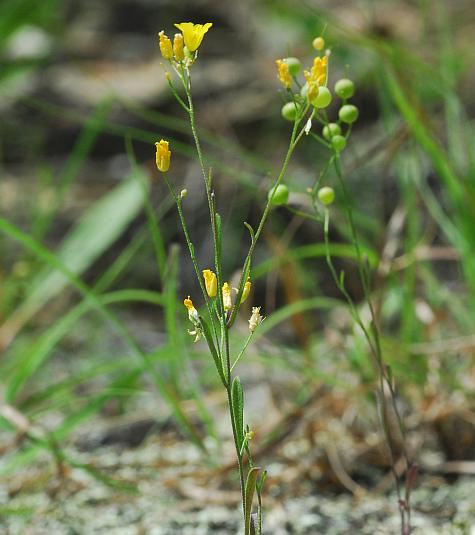Physaria filiformis (Rollins) O'Kane & Al-Shehbaz

Native
CC = 9
CW = 5
MOC = 4
© SRTurner
Physaria filiformis (Rollins) O'Kane & Al-Shehbaz | |
 |
Native CC = 9 CW = 5 MOC = 4 |
© SRTurner |
|
Family - Brassicaceae Habit - Annual forb with stellate, sessile hairs. Stem - Erect or ascending from a spreading base, to 25 cm, densely pubescent with overlapping stellate hairs.
Leaves - Alternate and basal, simple. Basal leaves 1.0-2.4 cm long, petiolate, the blades circular to spatulate, the margins entire or slightly wavy, both surfaces densely and evenly pubescent. Stem leaves 0.5-2.0 cm long, gradually reduced toward the stem tip, spatulate, oblanceolate, or linear, the lower leaves short-petiolate, the upper leaves sessile, the bases not clasping, the margins entire. Inflorescences - Terminal, ebracteate racemes. Flowers - Sepals 2.5-4.5 mm long, oblong or elliptic, ascending. Petals 5-9 mm long, yellow. Styles 3-5 mm long.
Fruits - Nearly spherical, 3-4 mm long, glabrous, without a stalk above the attachment point of the perianth. Seeds 2 per locule.
Flowering - April - May Habitat - Limestone glades. Origin - Native to the U.S. Lookalikes - P. gracilis, also Camelina spp. Other info. - This plant is uncommon in Missouri, occurring within a tight group of four counties near the southwestern corner of the state. It was long considered a Missouri endemic before the discovery, in the 1990s, of additional populations in Arkansas. The plant is easily identified by its dense covering of star-shaped hairs, yellow flowers, and globose fruits. In good years it can form large populations, but is much sparser under more challenging conditions. The plant was listed as Endangered by the U.S. Fish & Wildlife Service prior to the discovery of the Arkansas populations. Photographs taken at Lake Ouachita State Park, Garland County, AR, 5-5-2015 (SRTurner). |